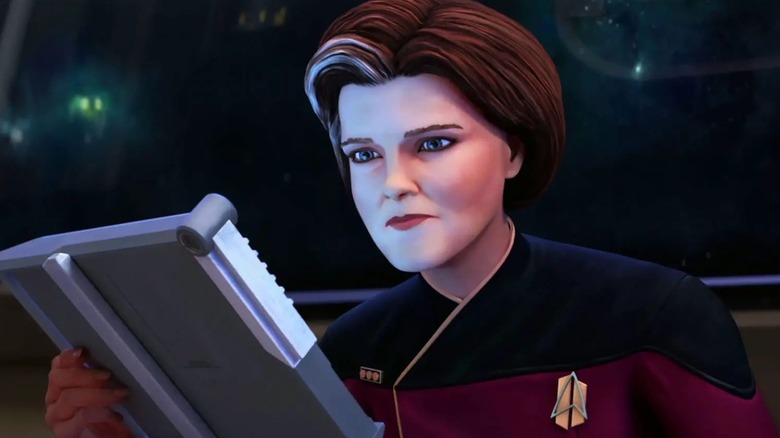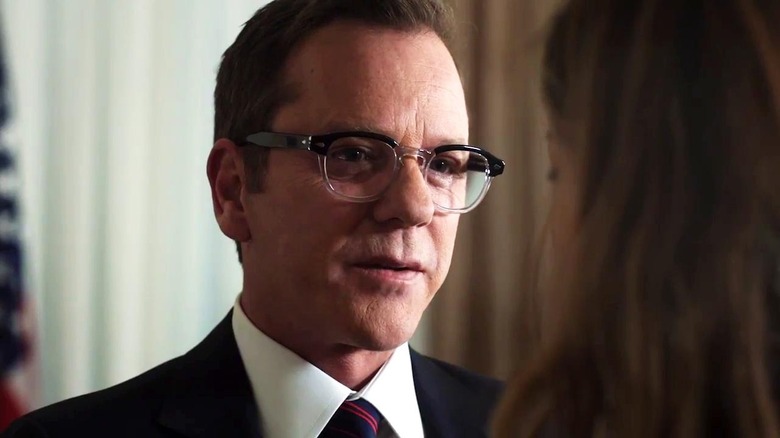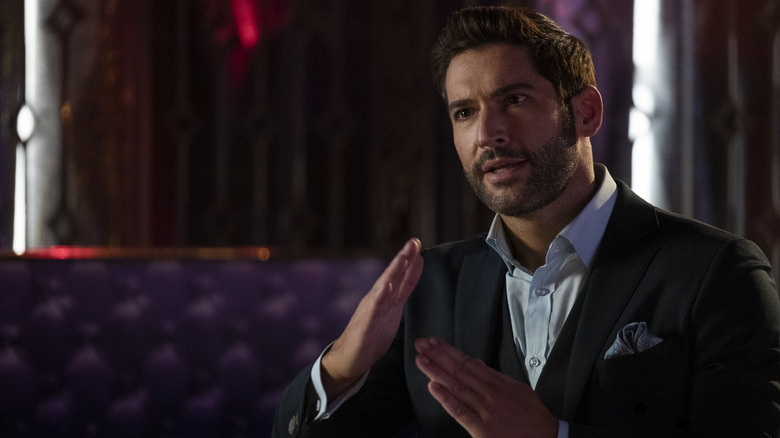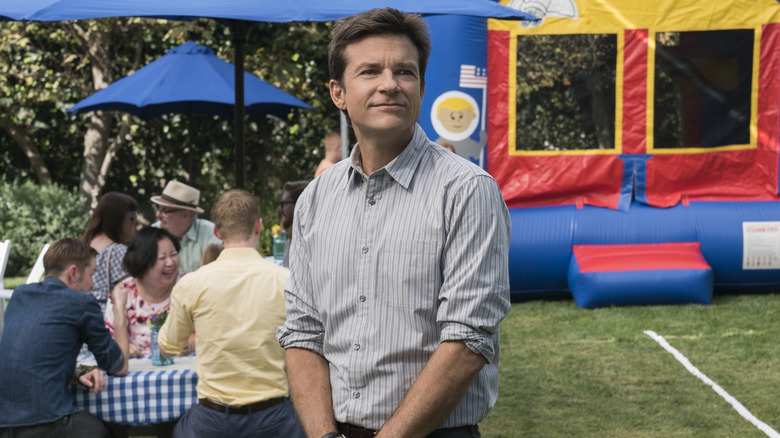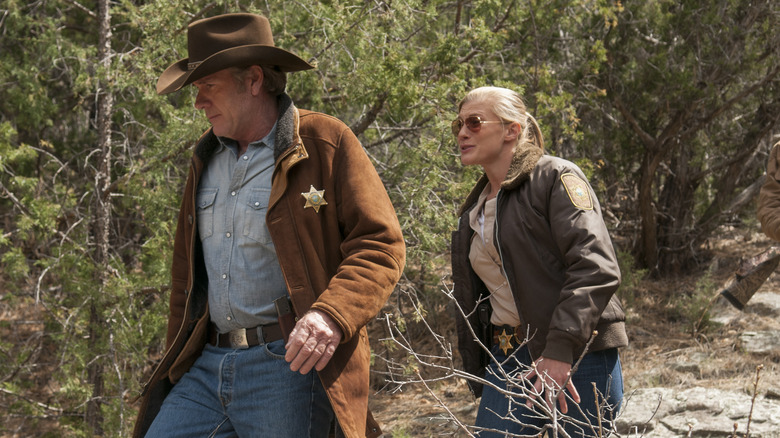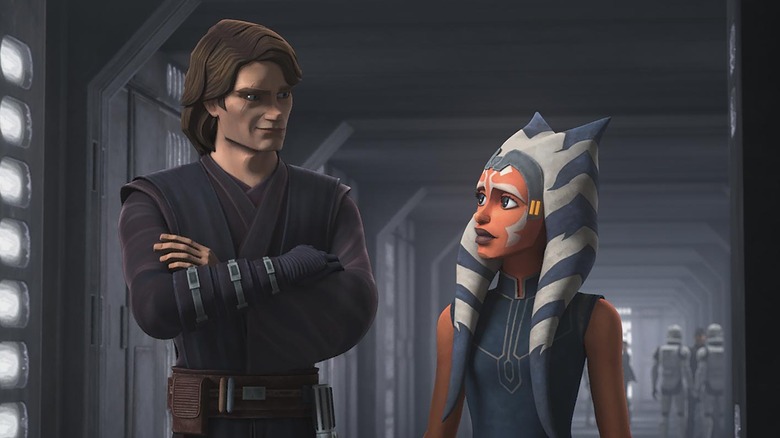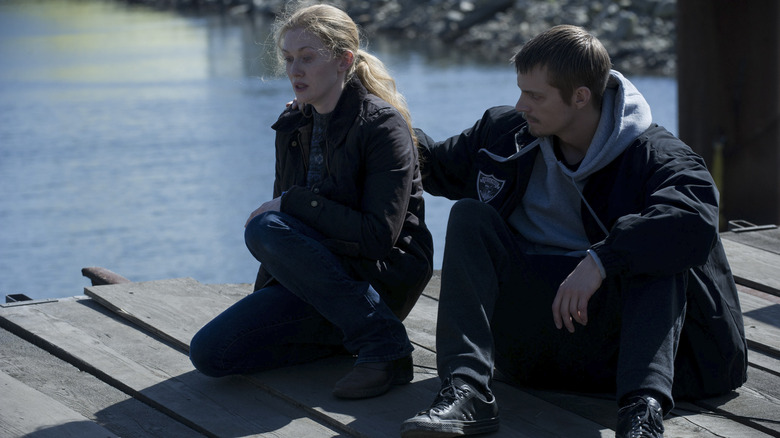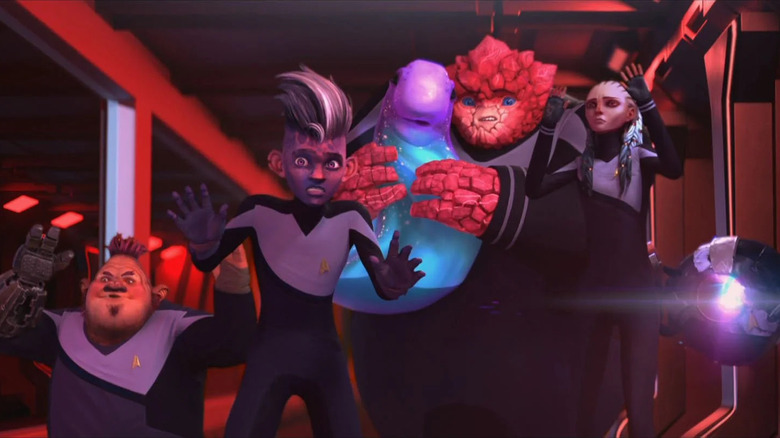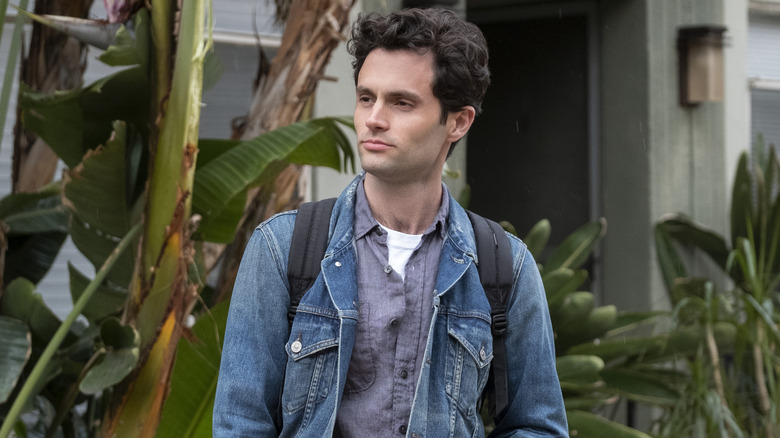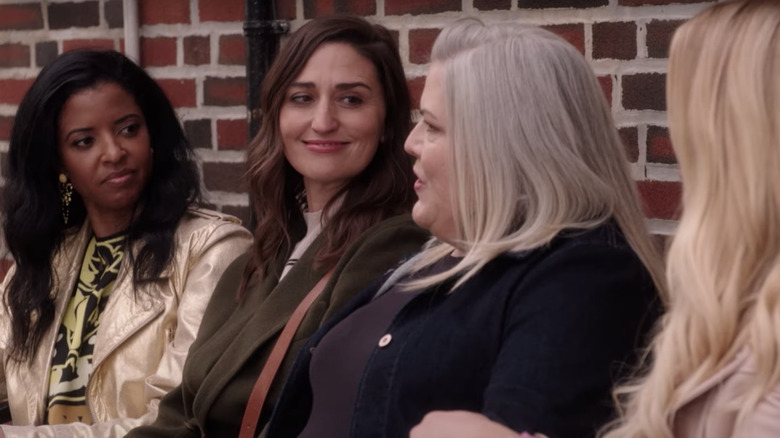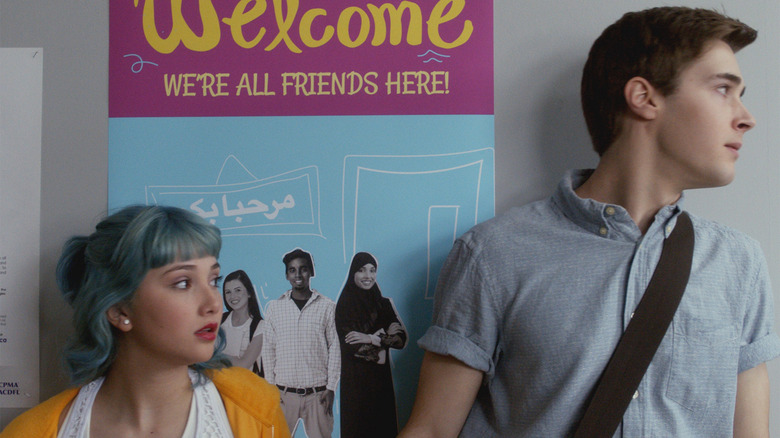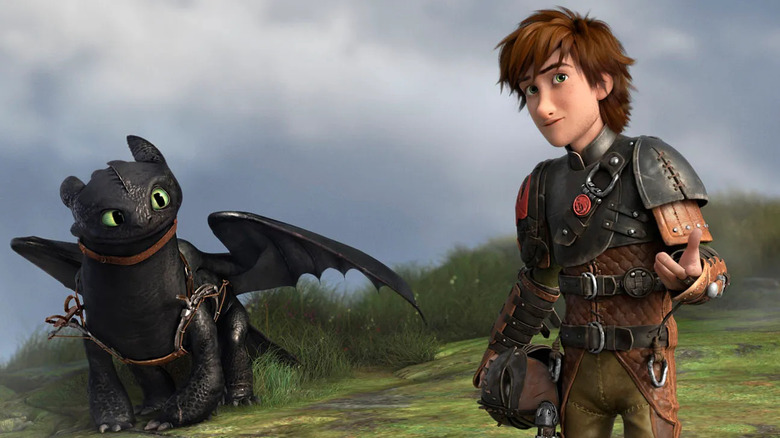Canceled TV Shows That Were Saved By Netflix
It's hard to deny that we're enjoying one of the greatest periods in television history, with new installments of top-notch entertainment arriving practically every day. But even some of the greatest shows wind up meeting their demise too soon, suffering a fate dreaded by both the cast and fans alike: cancellation. However, streaming services have revolutionized the way audiences watch their favorite shows, and that grim outcome doesn't always mean the end.
Netflix in particular has led the way, becoming the most notable platform when it comes to reviving shows from the brink of death. Since the company began its online services back in 2007, they've been credited with breathing new life into many hit series. Whether it's the result of impassioned fans rallying together in a desperate attempt to keep their beloved series going, or just executives recognizing a show that has plenty of potential left, we'll be taking a look at some of the most popular television shows granted a second chance on Netflix
Designated Survivor
With more than a decade under his belt playing federal agent Jack Bauer on "24," actor Kiefer Sutherland found his next big TV role as Tom Kirkman in "Designated Survivor." Kirkman is a humble U.S. cabinet secretary who is elevated to President of the United States following a devastating terror attack that wiped out most of the line of succession.
As the newly-installed President, Kirkman faces opposition from Capitol Hill who don't think he's up to the job. The series follows the tension that results as Kirkman adjusts to becoming Commander-in-Chief and the multiple crises that he must deal with in his new role. All the while, dark forces attempt to take him down. It's a thrilling premise, but audiences weren't watching in big enough numbers to get it more than two seasons on ABC, and they canceled it in May 2018. Worse still, the second season ended with a tease for a new storyline that many fans feared would go unresolved.
Four months after getting the axe, Netflix grabbed the series and gave it a third season, with a bold new storyline. It received good reviews — even better than Season 2 — but Netflix only gave it a brief reprieve and did not renew it for Season 4.
Lucifer
You may do a double take when you learn that "Lucifer" is based on a DC Comics title, but that's exactly what it is, first airing on Fox in 2016. It follows the devil himself in the mortal guise of Lucifer Morningstar (Tom Ellis), who comes to Earth after growing weary of ruling over the netherworld. Now in Los Angeles, Morningstar owns and operates an upscale night club and moonlights as a consultant for the Los Angeles Police Department, all while demons and angels attempt to get him back to Hell.
The comic that the series is based on was created by Neil Gaiman and Sam Kieth, the same team behind the original "Sandman" comics. The adaptation was a hit with fans, and it grew an instant cult following. However, ratings just weren't strong enough to sustain it past three seasons on network TV. Devastated, fans immediately launched a campaign to save the show, flooding social media with messages urging Fox to give the show a fourth season.
While Fox didn't budge, the campaign got the attention of Netflix, and within just a few weeks they agreed to pick up the series. This time, it wasn't just for one year. The streaming service renewed the series twice more, granting the audience's wish and providing three more seasons of "Lucifer" after its cancellation by Fox.
Arrested Development
When "Arrested Development" first arrived on Fox in 2003, critics hailed it as a clever, inventive, smart comedy unlike anything else that was on the air. Fans agreed, and it grew a fervent following that helped it get three seasons, despite seriously low ratings. To their credit, Fox gave it more than a fair shot to catch on, but wider audiences didn't seem ready for its offbeat, eccentric sense of humor and long-running gags that sometimes took years to pay off.
The show's uniqueness, attention to detail, and hidden humor make it perfect for binging, but streaming services didn't exist when "Arrested Development" first aired. A full seven years after it was booted from network television, Netflix decided to take a chance and bring back the series. It was a truly unexpected comeback, but producer and creator Mitchell Hurwitz was able to corral the entire cast back together, including Jason Bateman, Jessica Walters, David Cross, Will Arnett, Michael Cera, and Portia De Rossi, among others — even as some of them had become huge stars in the interim.
Relaunched in 2013, "Arrested Development" was better than ever, and Hurwitz used its new status as a bingeable series to tell a nonconventional, nonlinear story. The show got two more seasons as well as a fun bonus extended, recut version of its first revived year.
Longmire
The neo-Western "Longmire" debuted in 2012 on A+E Network, based on a series of books by Craig Johnson. The series starred Robert Taylor as a small-town Wyoming sheriff bordering an Indian reservation. It followed his various investigations with the help of Deputy Moretti (Katee Sackhoff) and his Native American ally and friend Henry Standing Bear (Lou Diamond Phillips). The show did well for the network, even coming in as their second most-watched series.
For A+E, though, "Longmire" wasn't worth keeping. That's because the meat of their schedule was filled out with cheaply-produced reality TV shows like "Storage Wars," "Duck Dynasty," and "Hoarders," so the comparatively costly "Longmire" – which was shot on location in New Mexico – just didn't make much sense. Following three hit seasons, the network gave it the axe, which was all the more shocking because the season had ended on a cliffhanger finale, forcing fans to wonder if they'd ever get a resolution.
Thankfully, fans wouldn't have to wait long to breathe a sigh of relief. Just a month or so after being canceled, "Longmire" was snatched up by Netflix, who aired Season 4 the following year. They'd renew the series two more times, allowing the series to total an impressive six seasons, finally concluding in 2017. It's a good thing Netflix saved the day because some of its best episodes came during its final three seasons.
Star Wars: The Clone Wars
In the quiet years that followed the "Star Wars" prequels, the only thing fans had to keep them going on-screen was "Star Wars: The Clone Wars," a CGI-animated children's series. The kid-friendly animation belied some surprisingly mature themes, and it focused on the period between "Star Wars: Episode II – Attack of the Clones" and "Star Wars: Episode III – Revenge of the Sith," following the adventures of Obi-Wan, Anakin Skywalker, and his previously unseen padawan, Ahsoka Tano.
"The Clone Wars" aired on Cartoon Network for five seasons and expanded the "Star Wars" canon in major ways, introducing fans to a wide variety of new characters and stories. It was a huge hit with fans of all ages, but Cartoon Network canceled it in 2013. Producers revealed that work on Season 6 was underway when they got the news, and clips from several half-finished episodes began making the rounds, just as showrunner Dave Filoni promised they would be released eventually.
That "eventually" came the following year. In early 2014, Lucasfilm and Netflix announced that the unfinished stories had been completed and they released them as Season 6, "The Lost Episodes," later that year. It was a big win for fans, but not the last they'd see of the series, and "The Clone Wars" returned in 2020 with a proper seventh season, this time on Disney+.
The Killing
Based on a Swedish crime drama, "The Killing" starred Mireille Enos and Joel Kinnaman as Sarah Linden and Stephen Holder, a pair of Seattle homicide detectives who in the first season are on the hunt for a dangerous murderer after teenager Rosie Larsen (Katie Findlay) turns up dead. The investigation is complicated, however, by a political campaign that Linden and Holder suspect may be somehow tied to the case. Season 2 continues the investigation into Larsen's murder, while Season 3 begins a new one as the duo tracks an apparent serial killer.
Receiving rave reviews in its first year, "The Killing" put both Enos and Kinnaman on the map with breakout performances. The series was initially canceled after Season 2, but AMC changed their minds at the last minute. Unfortunately Season 3's ratings weren't up to par, and the network put it out to pasture in 2013, after which Fox — who produced the series — searched for a new home. And it was Netflix who swallowed it up.
At the time, the streaming service only had a handful of its own shows, so the acquisition of a critically acclaimed series helped add prestige and got them new attention — and subscribers eager for more. Season 4 debuted in 2014, but was just six additional episodes, after which it was canceled for the final time.
Manifest
"Manifest" chronicles the harrowing personal journeys of 191 passengers of an ill-fated airline flight. Taking off from Jamaica and bound for New York, the flight lands safely but passengers discover to their horror that more than five years have somehow passed while they were in the air. As if resurrected from the dead, they struggle to rejoin a world that has moved on without them, attempting to pick up the pieces of their lost lives.
Good reviews and strong word of mouth helped propel "Manifest" to three solid seasons, as the story went from drama to mystery to supernatural thriller. But after its second year, ratings plummeted, and NBC was forced to end the series. Series creator Jeff Rake claims he'd had a roadmap for a full six-year run, and expressed interest in continuing the series elsewhere. Thanks to the show doing well on Netflix — where it peaked at No. 1 – the streaming service seemed to be an ideal home for more seasons.
Surprisingly, Netflix passed on a pick-up in 2021, at least initially. But its enduring popularity on the service forced their hand, and in August of that year, they rescued "Manifest" from oblivion. In 2022, the series debuted 10 new episodes comprising the first half of its fourth and final season, with another 10 closing out the show in 2023.
Star Trek: Prodigy
Since the small screen return of "Star Trek" in 2017, it's produced shows that appeal to different kinds of fans. For kids, the answer was "Star Trek: Prodigy," a CGI-animated series co-produced by cable giant Nickelodeon. It premiered exclusively on Paramount+ in 2021, with ten episodes that were later aired on Nickelodeon. A year later, a second batch of 10 episodes completed the show's first season.
Set in the far-flung Delta Quadrant, "Prodigy" follows a group of misfit alien kids who discover a derelict Federation ship and hijack it to escape the prison planet of Tars Lamora. Pursued by the sinister Diviner (John Noble), the kids get help from the ship's built-in holographic assistant which is modeled after former Captain Kathryn Janeway (Kate Mulgrew, reprising her role from "Star Trek: Voyager").
A wildly different series than fans may have expected, "Prodigy" raised the eyebrows of adult fans who found it just as thrilling as the best "Star Trek," no matter how different it might have been. But just months after the show took home a Children's Emmy Award, the series was canceled, even though work on a second season was well underway. To make matters worse, the first season of "Prodigy" was removed from Paramount+. Following an outcry from fans, Netflix announced they'd picked up the series, with Season 2 set to debut sometime in 2024.
You
"You" was created by Greg Berlanti and Sera Gamble, two successful producers who'd each been involved in plenty of hits, from "Dawson's Creek" and "The Flash" to "The Magicians," and "Supernatural." The series stars Penn Badgley as Joe Goldberg, the manager of a New York bookstore who is also a serial killer with a long history of stalking and murdering his ex-girlfriends. His latest obsession is Guinevere Beck (Elizabeth Lail) — a talented young writer — and he uses social media as a weapon to get what he wants.
The first season of "You" received glowing reviews and a 94% on Rotten Tomatoes while airing on Lifetime. Even with critics singing its praises, though, the cable channel immediately dumped the show after its first season, citing low ratings. But a second season was already underway and Netflix took over the show without hesitation. The streaming service had previously gobbled up the air rights for the series' existing episodes after its debut, both in the U.S. and abroad, and was already having success with it.
Since making its debut on Netflix in 2019, "You" has become one of the most talked about dramas on the service. It's received a third and fourth season, and a fifth is on its way.
Girls5Eva
Writer Meredith Scardino's credits are impressive, getting her start in late night working with David Letterman, "The Daily Show," and "The Colbert Report" before jumping to sitcoms like "The Unbreakable Kimmy Schmidt." In 2021 she created her first series, "Girls5eva," produced by Tina Fey, which landed at Peacock and starred Sara Bareilles, Busy Phillips, Paula Pell, Renée Elise Goldsberry, and Daniel Breaker.
An unlikely musical comedy, "Girls5eva" introduces a group of four middle-aged women who were once a pop group and a one-hit-wonder back in the '90s. Some 30 years later, the group finds themselves back in the spotlight after their music makes an unexpected comeback. Now, the group of older women decide to reinvigorate their humdrum lives by making new music together and embracing their second chance at fame.
Stellar reviews lauded "Girls5eva" for its fresh concept, poignant story, and uproarious laughs. So when Peacock dropped the show following its first two seasons, Netflix didn't wait, jumping on the chance to add it to their collection of streaming originals — a rare case of a series moving from one streaming service to another. The show's third season has been completed, but no airdate has been announced yet.
Degrassi: The Next Generation
"Degrassi" is one of the longest-running Canadian TV franchises, born out of a 1979 children's TV show called "The Kids of Degrassi Street." By the late '80s it had morphed into a teen drama, and over the years featured sequels and spin-offs like "Degrassi Junior High" and "Degrassi High." In 2001, the series was overhauled and became "Degrassi: The Next Generation," which ran for an astonishing 14 seasons across three Canadian networks: CTV, MuchMusic, and MTV Canada. Stateside, it aired on TeenNick towards the end of its run.
In 2015, "Degrassi: The Next Generation" came to a close, but it wasn't for long. In June of that year, Netflix and Canadian broadcast network Family Channel announced they'd picked up the series for a new season of 20 episodes. They'd give the show a slight makeover, retitling it "Degrassi: Next Class," and adding a few new cast members. The show got three seasons on Netflix, but it was axed again in 2019.
In early 2022, HBO Max announced they'd acquired the show and would be rebooting it as "Degrassi." To the shock of fans, though, the revival was canned before it even got started, canceled in the wake of HBO's merger with Discovery and the eventual rebrand to "Max."
Cobra Kai
Legacy TV sequels are all the rage these days, but it's rare for them to become as beloved as "Cobra Kai," the TV follow-up to "The Karate Kid" film series starring Ralph Macchio. The show made its initial appearance on YouTube Red in 2018 and was an instant hit with fans and critics. A surprisingly heartfelt story flipped the script on the franchise as villain Johnny Lawrence (William Zabka) becomes a strange kind of anti-hero tutoring a group of bullied teens in his reopened dojo, the titular Cobra Kai.
Daniel LaRusso (Macchio), meanwhile, watches the return of Lawrence and fears he's returned to his old and evil ways and restarts his own dojo to stop him. Unlike so many other recent revivals, "Cobra Kai" didn't pretend that its lesser sequels didn't happen, with unexpected returns for characters from "The Karate Kid Part II" and "The Karate Kid Part III," much to the delight of fans. But YouTube Red wasn't the huge success the service had hoped for, and they scrapped all of its scripted programming, including "Cobra Kai."
Seeing an opportunity, Netflix pounced, grabbing "Cobra Kai" for both its back catalog and new seasons, making it a No. 1 hit. On Netflix, the series received two more years, with a sixth and final season due in 2024.
DreamWorks Dragons
Making a TV spinoff of a hit animated movie is certainly nothing new, but they are rarely as good as their big-screen counterparts. In 2012, though, Cartoon Network launched "DreamWorks Dragons," a series that saw the movie's cast return in a direct sequel, with high-quality CGI animation that looked nearly as good as the movies. Airing just two years after the first "How to Train Your Dragons" film in 2012, the series kept kids engaged through two seasons before the theatrical sequel landed in 2014.
Unfortunately, Cartoon Network didn't seem happy with the show's performance because they let it lapse, dropping it from the schedule after two seasons and providing a huge opening for Netflix. Eager to add to its ever-expanding library of kid's content, the service signed "Dragons" up for new seasons, which began airing just a year after its CN run ended. Amazingly, Netflix renewed the show five more times, giving fans an additional six seasons before "Dragons" closed its doors in 2018 ahead of the release of the film threequel, "How to Train Your Dragon: The Hidden World" a year later.
